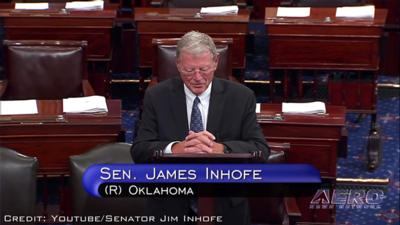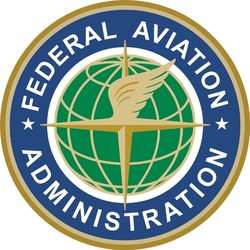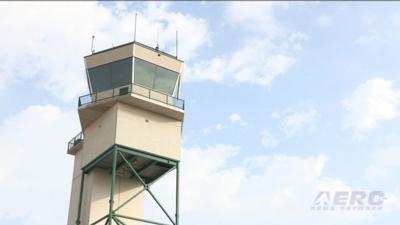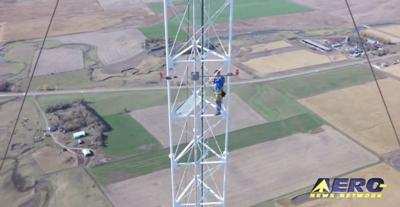Calls Bill 'Critical' To Ensuring The Viability Of GA
U.S. Sen. Jim Inhofe (R-OK), member of the Senate General Aviation Caucus and certified flight instructor with more than 11,000 flight hours, voted Tuesday in favor of the FAA Reauthorization Act of 2016 that passed the Senate by a vote of 95 to 3.

“I applaud the Senate for passing the FAA Reauthorization Act with broad bipartisan support,” said Inhofe. “It is a comprehensive bill with many important provisions that will benefit Oklahomans and the general aviation community by strengthening the cost-effective contract tower program and removing red tape that delays adoption of new safety technologies in the aviation sector. I am proud that this legislation includes my amendment to allow companies to use unmanned aircraft systems for the purposes of maintaining critical infrastructure, such as oil and gas pipelines. It also includes the Pilot’s Bill of Rights 2, which has 70 cosponsors and passed the Senate last year and includes provisions reforming FAA’s current medical certification process for General Aviation pilots.”
“The authorizations and other provisions included in this bill are critical to ensuring the general aviation community will continue to have access to and use our national airspace. It further directs FAA resources to support additional investment in airports across the country through the Airport Improvement Program and more fully integrate the use of unmanned aerial vehicles into the national airspace safely and with the full engagement of the aviation stakeholder community.”
The following are provisions Inhofe authored or supported that were included in the FAA Reauthorization Act at final Senate passage:
Pilot’s Bill of Rights 2
The FAA Reauthorization Act includes Inhofe’s bipartisan Pilot’s Bill of Rights 2, which first passed the Senate by unanimous consent on Dec. 15, 2015. This legislation would reform the third class medical certification for recreational pilots and broaden the protections in the original Pilot’s Bill of Rights authored by Inhofe and signed into law in 2012.

“There are a number of good provisions for general aviation in the Senate FAA Reauthorization legislation including third-class medical reform, which is a top priority for AOPA and our members,” said Mark Baker, president of the Aircraft Owners and Pilots Association. “The Pilot's Bill of Rights 2 language included in this bill will improve safety and reduce needless costs that are being imposed on general aviation pilots by an antiquated and bureaucratic process. This is the second time in five months that the Senate has passed bipartisan third-class medical reform, and there are now several bills in the House of Representatives that will get third-class medical reform across the finish line. AOPA thanks Senator Inhofe for his tireless work and leadership to protect the freedom to fly and general aviation’s many contributions to America.”
“The Senate has demonstrated its support for the importance of general aviation by twice passing the Pilot’s Bill of Rights 2 language – first as a stand-alone bill in December and now as part of FAA reauthorization,” said Jack Pelton, CEO/chairman of the Experimental Aircraft Association. “It will help tens of thousands of pilots to avoid the complexity and expense inherent in the current third-class medical certification process. We sincerely thank Sen. Inhofe for his leadership and other supporters for their bipartisan efforts to gain approval in the Senate for this and other FAA reauthorization provisions that protect and build general aviation.”
Contract Towers
The federal Contract Tower Program serves a vital role in connecting smaller airports and rural communities with the National Aviation System. Restricting or reducing the operations of contract towers would have a substantial, negative impact on general aviation safety, the efficiency of large commercial airports, emergency medical operations, law enforcement, agriculture activities and businesses throughout the United States. In addition, many contract tower airports are located near or adjacent to military bases and manage a substantial number of military-related and national security operations, directly supporting the readiness and training of military units, as Inhofe noted in a letter on Nov. 23, 2015, to committee leaders. The FAA Bill maintains the contract tower cost-share program, which allows local communities to share in the costs of maintaining their airport’s contract tower. Per the request of Inhofe in a letter to committee leaders on March 13, 2015, the bill also removes government
red tape requiring contract towers to submit annual cost/benefit reports to FAA. Moving forward, these reports would be tied to specific air traffic levels, ensuring communities invest resources in their control tower and their airport, instead of filling out unnecessary paperwork.

“All 253 airports with FAA contract towers across the country are very grateful for Sen. Inhofe's outstanding leadership in the Senate pushing for pro-airport and pro-safety provisions in the FAA reauthorization bill. Sen. Inhofe has been a long time champion for the contract tower program and our industry is extremely appreciative for his leadership on this highly successful government/industry air traffic safety partnership program,” said Walt Strong, director of the Max Westheimer Airport in Norman, Oklahoma and chair of the U.S. Contract Tower Association, an affiliated organization of the American Association of Airport Executives.
Aircraft Certification
Oklahoma’s aerospace industry, which includes commercial, military and general aviation manufacturing, testing, researching and maintenance activities, is directly responsible for billions of dollars of economic output and employing thousands of people. This bill includes reforms to FAA’s process for certifying general aviation aircraft and aviation products such as engines and avionics. This bill also ensures that FAA maintains strong engagement with industry stakeholders so FAA’s safety oversight and certification processes includes performance-based objectives and tracks performance-based metrics. This is key to eliminating bureaucratic delays and increasing accountability between FAA and the aviation community for type certificate resolution or the installation of safety enhancing technology on small general aviation aircraft.
ATC Instructors
The FAA bill includes a provision to encourage the hiring and retention of high-quality air traffic controller instructors. These instructors, who are required to have prior experience as air traffic controllers, are discouraged from working full-time due to existing government regulations because they are former air traffic controllers. Without full-time instructors, four times as many part-time instructors are needed to provide the needed instruction time to train the next generation of controllers to manage air traffic at control towers in Oklahoma and across the country. This provision will remove the government regulations that discourage full-time instructors. It was adopted as an amendment during the committee markup on March 16, offered by Sen. Jerry Moran (R-Kansas) on behalf of Inhofe.

UAVs for Critical Infrastructure
Adopted as amendment #3492 on April 11, Inhofe’s amendment would direct FAA to establish rules to allow critical infrastructure owners and operators to use unmanned aircraft systems to assist with compliance of existing federal regulations and to respond to natural disasters.
“We applaud and appreciate Sen. Inhofe stepping forward with this amendment,” said Martin Edwards, vice president of Legislative Affairs for the Interstate Natural Gas Association of America. “The natural gas pipeline industry is always seeking new safety-related technologies, and small unmanned aircraft offer an excellent option. These tools can be used for pipeline right of way inspections, surveys, and emergency response. The end result is more effective and efficient pipeline safety programs.”
“EEI thanks Senators Inhofe and Booker for their leadership in successfully championing an amendment to the Senate Federal Aviation Administration reauthorization bill to help the electric power industry’s efforts to build and maintain a smarter, more resilient grid to deliver safe and reliable energy to our customers,” said Tom Kuhn, president of the Edison Electric Institute. "EEI’s member companies already utilize unmanned aircraft systems (UAS) for some important functions, but this amendment takes a significant step forward that will enable our members to better utilize UAS to improve routine maintenance of our energy infrastructure and to help more rapidly restore service to our customers following natural disasters.”
“America's electric cooperatives appreciate Chairman Inhofe's leadership in passing legislation to streamline the permitting process for UAVs. This legislation will enable cooperatives to reduce risk for their employees, shorten outage times and save money for their member-owners,” said Interim CEO Jeffrey Connor, NRECA.
“We greatly appreciate the Inhofe-Booker amendment prioritizing drone use for energy and electric power reliability,” said Sue Kelly, president and CEO of the American Public Power Association. Reliable power is critical to national security, life safety, economic health and the safe operation of the national airspace. The use of new technologies like drones will help electric utilities conduct efficient system inspections and restore power faster when there are outages.”
“The number one goal of the oil and natural gas industry is zero incidents, and unmanned aerial system (UAS) technologies provide enormous potential to improve the safe operation of all oil and natural gas infrastructure through the ability to safely conduct preventative inspections and response activities,” said Robin Rorick, group director of Midstream and Industry Operations at the American Petroleum Institute. We applaud the passage of FAA Reauthorization and Senator Inhofe, in particular, for his visionary provision in the legislation that would allow UAS utilization for oil and gas facilities, refineries and pipeline inspection and response activities.”
Contract Weather Observers
The bill included amendment #3508, cosponsored by Inhofe, which would prevent FAA from cutting Contract Weather Observer (CWO) service at 57 of the nation’s airports, including Will Rogers World Airport and Tulsa International Airport, through September 2017. These observers are meteorological professionals that record and interpret weather and climate data and supply that information to pilots, airlines, the National Weather Service, and local news meteorologists. This amendment ensures FAA submits to Congress a report that details all safety risks, and operational effects on airports and airlines that could result from the loss of CWO service at the 57 airports targeted.
(Source: Senator Inhofe news release. Images from file)
 ANN's Daily Aero-Term (04.26.24): DETRESFA (Distress Phrase)
ANN's Daily Aero-Term (04.26.24): DETRESFA (Distress Phrase) ANN's Daily Aero-Linx (04.26.24)
ANN's Daily Aero-Linx (04.26.24) Airborne 04.22.24: Rotor X Worsens, Airport Fees 4 FNB?, USMC Drone Pilot
Airborne 04.22.24: Rotor X Worsens, Airport Fees 4 FNB?, USMC Drone Pilot Airborne 04.24.24: INTEGRAL E, Elixir USA, M700 RVSM
Airborne 04.24.24: INTEGRAL E, Elixir USA, M700 RVSM Airborne-NextGen 04.23.24: UAVOS UVH 170, magni650 Engine, World eVTOL Directory
Airborne-NextGen 04.23.24: UAVOS UVH 170, magni650 Engine, World eVTOL Directory






